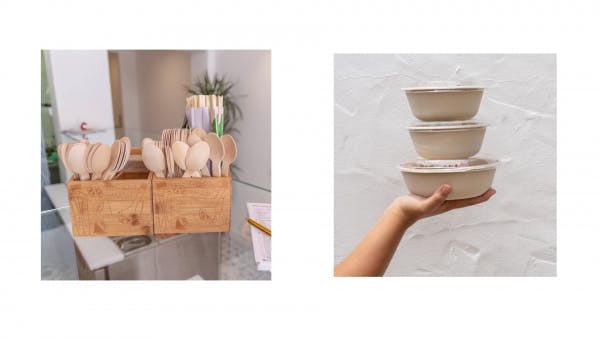
The Glovo Green Deal

According to NASA, the average global temperature has increased by about 1.1 degrees Celsius since the late 19th century, with the majority of this warming occurring in the past few decades. The past decade (2010-2019) was the hottest on record, and shockingly, the five hottest years on record have all occurred since 2015.
Climate change is causing sea levels to rise and extreme weather events, such as heatwaves, hurricanes, and wildfires, to become more frequent – actively putting millions of people across the globe in vulnerable circumstances.
These statistics highlight the urgent need for action to address climate change and reduce global warming, making the role of individuals, governments, and companies more important than ever.
The road to reducing our carbon emissions
At Glovo, we invest significant efforts in sustainable business practices, from the introduction of the Impact Fund and many other initiatives that help to improve the lives of Partners, Users, Couriers, and local communities. With these programs in place, we aim to reduce our carbon emissions by 42% by 2030.
In order to develop a realistic action plan, we had our targets validated by the Science Based Targets initiative (SBTi), consistent with the greenhouse gas emission reduction required to keep global warming below 1.5Cº.
We were able to identify 5 key areas across our value chain with the most potential for impact:
Sustainable Packaging
Our goal is to ensure that 92% of orders use sustainable packaging by 2030
Reducing Food Waste
We aim to ensure that 10% of our orders have a social purpose and reduce food waste by donating surplus to NGOs via Glovo Access.
Electric Vehicles
By 2030, our goal is to have 64% of orders delivered by non-combustion vehicles.
Logistics Optimization
Thanks to our tech, our ambition is to ensure that 30% of orders are optimized to reduce the distance traveled by couriers
Renewable Energy
By 2030, to have 100% of our locations powered by renewable energy. In Spain, for example, 100% of our locations are already being run with renewable energy and our global goal is 31%.
Sustainable Packaging
For Partners like Ibiza Poke, having access to sustainable packaging is essential to their business and the health of their island and home. It has been estimated that CO₂ emissions from materials used for packaging are more than those caused by global aviation. In order to manufacture one kilogram of plastic, 3.5 kg of CO2 are emitted into the atmosphere
David, the co-founder of Ibiza Poke, notes that, “In Ibiza everyone is very aware that we live in a paradise that we must take care of, and you get this message as soon as you set foot on the island. Issues such as the protection of the seabed and Posidonia or the cleaning of beaches are the focus of great activism on the part of individuals and companies.
In the beginning, when we sometimes ran out of clean cutlery and brought out the typical white plastic forks, customers were quite surprised. Now, we use environmentally friendly and biodegradable packaging made from sugar cane and recycled plastic, as well as certified organic bamboo cutlery, which we buy from the Glovo Store”; an e-commerce platform that Glovo makes available to its partners to be able to purchase, among many services, products such as packaging with sustainable features.

“In addition, our products for the cleaning and maintenance of our locations are purchased through a local company, La Alternativa Eco, which produces environmentally friendly and non-polluting alternatives to support the marine environment.
In 2022 alone, Glovo sold 4.3 million units of sustainable packaging, doubling the numbers of 2021. So far in 2023, we’ve already sold 1,566,402 units of sustainable packaging.
Reducing Food Waste
Our mission to give everyone easy access to anything in the city doesn’t stop at last-mile logistics. One of our goals as a company is to have a high impact in the cities in which we operate and use our technology for good. According to the EU Commission, the European Union wastes more food than it imports. In fact, if food waste was a country, it would be the 3rd largest emitter after China and the USA.
Food waste costs EU businesses and households an estimated €143 billion a year and causes at least 6% of the EU’s total greenhouse gas emissions. To combat this major issue and In partnership Fundación Altius, we’ve been able to launch two Solidary Delivery Centres (SDC) in Spain to grant access to food for the most vulnerable collectives, leveraging the potential of food surplus and technology while reducing food waste.

This project, which is funded by the Impact Fund, works by:
- Collecting food surplus and donations from our network (supermarkets, NGOs, food banks, etc.) in a strategic point of the city.
- Creating food boxes in line with the nutritional, physical, and cultural needs of beneficiaries;
- Delivery of boxes to the beneficiaries’ homes through Glovo Access, our free last-mile logistic service for NGOs.
Pablo Aledo, General Director of Fundación Altius, mentions that, “In the current environment, established cooperations between NGOs and companies that are committed to improving civil society are essential to achieving high-impact results. The development of innovative processes allows us to improve our management capabilities and optimise our response capacity to the needs of the beneficiaries – in this case, food support programs for families in situations of social vulnerability.”
Electric Vehicles
When we reached carbon neutrality in early 2022, we knew that while the progress was good, there was still a lot to be done across our value chain. Two of the ways in which we are working towards our sustainability targets is through the adoption of a sustainable courier vehicle mix and logistics optimization.

Currently, only 1 in 250 cars sold globally are electric. Our goal is to achieve more than 67% being non-combustion vehicles across all of the markets in which we operate. To make this goal a reality, our two-pronged approach includes:
- Improving affordability of electric vehicles by partnering with suppliers (like Zoomo in Spain) or by helping our 3PL partners change their fleet to electric.
- Converting our owned fleet to Electric Vehicles (which has already been done in Spain thanks to public funding from NextGen)
As of today, 5 countries have a vehicle fleet with more than 40% non-combustion vehicles including Croatia, Italy, Kyrgyzstan, Ukraine, and Nigeria. In Croatia, alone, thanks to our partnership with Meta Mate, we are now delivering more than 50% of orders with non combustion vehicles.
Additionally, thanks to our tech, we’re able to optimize logistics for couriers working with our App meaning we’re able to reduce the distance traveled between orders.
Companies that invest in sustainable business practices can reduce their environmental impact, build brand value, and improve their bottom line. While apps like ours face the complexity of needing to reduce Scope 3 emissions, our main challenge moving forward is to find ways to incentivize our ecosystem to change their everyday habits.
While this is only the beginning and we still face many challenges ahead, by adopting more sustainable business practices throughout our value chain and using our tech for good, we’re hope to have an active role in building a brighter future for tomorrow.